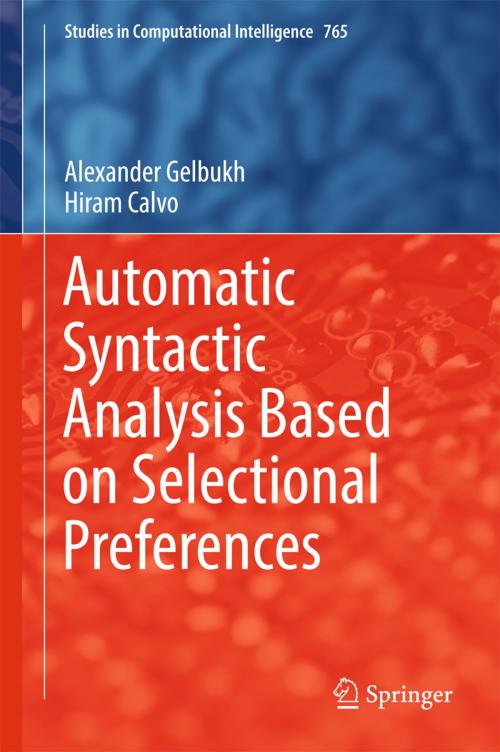Automatic Syntactic Analysis Based on Selectional Preferences
Nonfiction, Computers, Advanced Computing, Artificial Intelligence, Reference & Language, Language Arts, Linguistics, General Computing| Author: | Alexander Gelbukh, Hiram Calvo | ISBN: | 9783319740546 |
| Publisher: | Springer International Publishing | Publication: | February 28, 2018 |
| Imprint: | Springer | Language: | English |
| Author: | Alexander Gelbukh, Hiram Calvo |
| ISBN: | 9783319740546 |
| Publisher: | Springer International Publishing |
| Publication: | February 28, 2018 |
| Imprint: | Springer |
| Language: | English |
This book describes effective methods for automatically analyzing a sentence, based on the syntactic and semantic characteristics of the elements that form it. To tackle ambiguities, the authors use selectional preferences (SP), which measure how well two words fit together semantically in a sentence. Today, many disciplines require automatic text analysis based on the syntactic and semantic characteristics of language and as such several techniques for parsing sentences have been proposed. Which is better? In this book the authors begin with simple heuristics before moving on to more complex methods that identify nouns and verbs and then aggregate modifiers, and lastly discuss methods that can handle complex subordinate and relative clauses. During this process, several ambiguities arise. SP are commonly determined on the basis of the association between a pair of words. However, in many cases, SP depend on more words. For example, something (such as grass) may be edible, depending on who is eating it (a cow?). Moreover, things such as popcorn are usually eaten at the movies, and not in a restaurant. The authors deal with these phenomena from different points of view.
This book describes effective methods for automatically analyzing a sentence, based on the syntactic and semantic characteristics of the elements that form it. To tackle ambiguities, the authors use selectional preferences (SP), which measure how well two words fit together semantically in a sentence. Today, many disciplines require automatic text analysis based on the syntactic and semantic characteristics of language and as such several techniques for parsing sentences have been proposed. Which is better? In this book the authors begin with simple heuristics before moving on to more complex methods that identify nouns and verbs and then aggregate modifiers, and lastly discuss methods that can handle complex subordinate and relative clauses. During this process, several ambiguities arise. SP are commonly determined on the basis of the association between a pair of words. However, in many cases, SP depend on more words. For example, something (such as grass) may be edible, depending on who is eating it (a cow?). Moreover, things such as popcorn are usually eaten at the movies, and not in a restaurant. The authors deal with these phenomena from different points of view.















